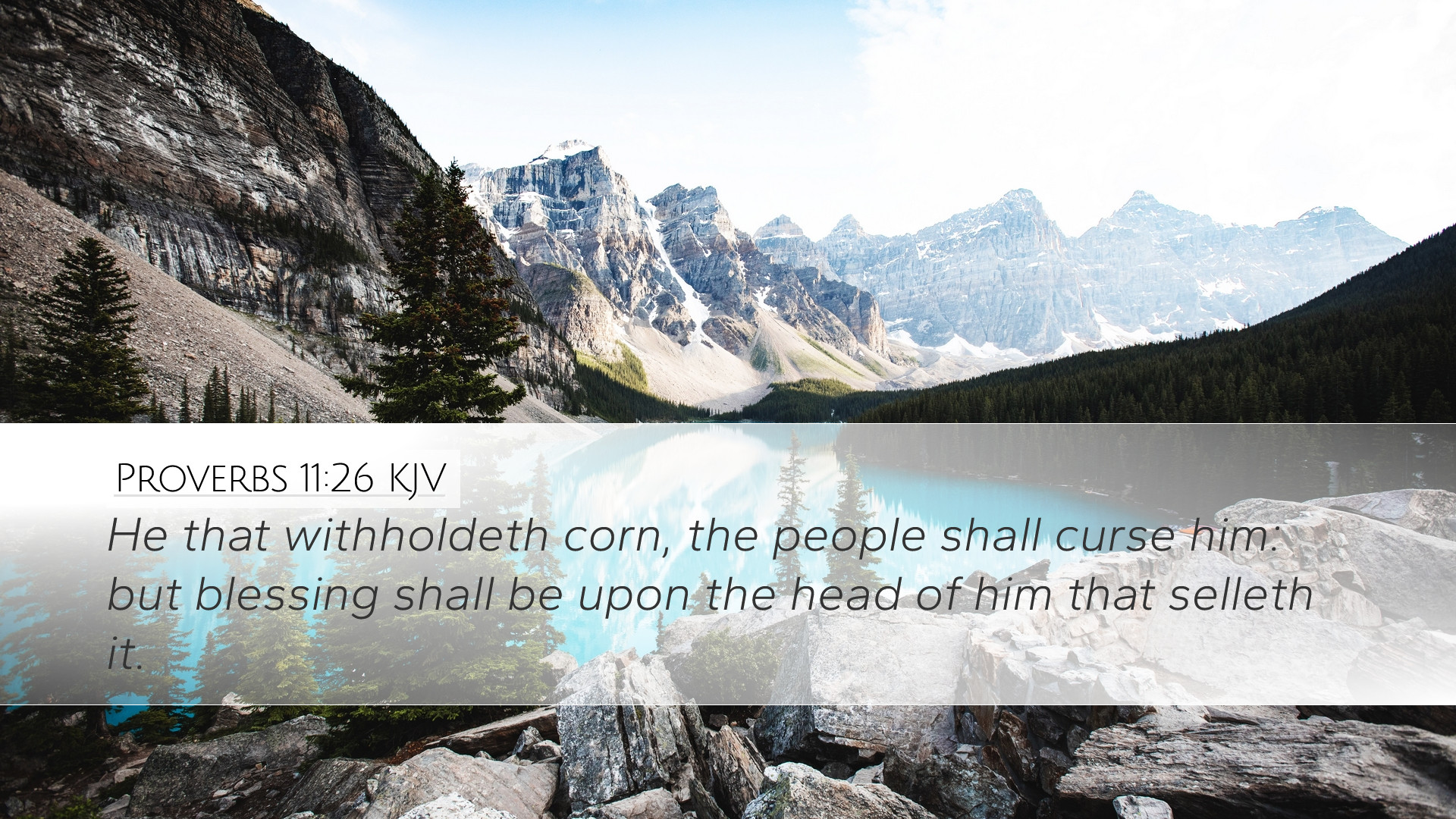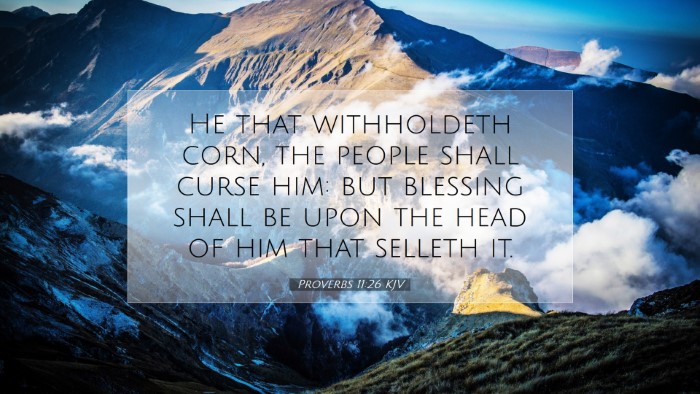Commentary on Proverbs 11:26
This verse states: "The people will curse him that withholdeth corn, but blessing shall be upon the head of him that selleth it." This scripture provides rich insight into the moral and ethical obligations associated with wealth and the abundance of resources.
General Overview
Proverbs 11:26 addresses the consequences of misusing one’s resources, particularly in times of necessity. The underlying principle of this verse is the ethical distribution of wealth, emphasizing the social responsibility of individuals, especially those in positions of prosperity. The passage yields profound implications for pastoral care, social justice, and economic ethics.
Insights from Matthew Henry
Matthew Henry explains that the withholding of grain, especially during a time of need, can be seen as a grievous sin against both God and humanity. He elaborates that the act of hoarding resources for personal gain can lead to dire consequences, not only in societal relationships but also spiritually. He emphasizes:
- Responsibility of the Wealthy: Those who possess resources have a responsibility to share them generously, particularly during times of famine or scarcity.
- The Law of Retribution: Henry highlights that those who withhold can expect to be cursed by the community, as their actions reflect a lack of compassion.
- Divine Approval: Conversely, those who sell their grain, especially at fair prices during crises, are blessed by God. Their actions lead not only to the well-being of others but also to their own favor in God’s eyes.
Reflections from Albert Barnes
Albert Barnes’ commentary enhances our understanding of the economic implications of the verse. He notes that the Hebrew word for 'withholdeth' implies a deliberate refusal to distribute resources to those in need. Barnes discusses how:
- Impact on Society: Withholding necessary goods leads to curses, which he interprets as societal disapproval and condemnation. Conversely, providing for others generates goodwill and community blessings.
- Economic Justice: This passage reflects a principle of economic justice, where the sharing of resources is a moral imperative that directly impacts community stability and harmony.
- Long-term Gains: Barnes argues that while selfish behavior may yield temporary benefits, it ultimately results in loss—spiritually and socially. The one who shares reaps enduring rewards.
Adam Clarke's Perspective
Adam Clarke offers a theological perspective on the verse, linking it to divine providence and moral duty. His observations include:
- God’s Provision: Clarke interprets the blessings upon those who sell corn as indicative of God’s providence, suggesting that God rewards generosity and integrity in dealings.
- Community Dynamics: He emphasizes the social dynamic at play; when individuals hoard resources, they undermine communal support systems. This creates an environment of mistrust and animosity.
- Covenantal Responsibility: Clarke ties the moral responsibilities outlined in this proverb back to the covenantal relationship between God and His people, suggesting that faithfulness in small matters (like sharing grain) has significant implications for one’s standing before God.
Theological Themes
This verse evokes various theological themes relevant to today’s societal challenges:
- Social Justice: The idea that wealth should be used for the benefit of the community speaks to contemporary issues of economic disparity and social justice movements.
- Stewardship: A recurring theme in biblical teaching is stewardship. Proverbs 11:26 reinforces that material possessions are ultimately God’s and are to be used in service of others.
- Community and Collective Responsibility: The verse reminds believers of their role in fostering community well-being, an essential aspect of Christian living.
Application for Pastors and Theologians
For pastors, the implications of Proverbs 11:26 are manifold:
- Teaching Generosity: Pastoral teachings can focus on the importance of generosity as a reflection of Christian character and obedience to God.
- Advocating for the Poor: Churches may find inspiration in this verse to engage in outreach programs that support the needy, ensuring that their congregations practice what they preach.
- Ethical Business Practices: Pastors can encourage congregants engaged in business to adopt ethical practices that prioritize community welfare over profit margins.
Conclusion
Proverbs 11:26 serves as a potent reminder of the ethical responsibilities that accompany wealth and resources. From the commentary of Matthew Henry, Albert Barnes, and Adam Clarke, we glean essential insights into the nature of blessings, the consequences of greed, and the imperative of generosity. As such, this passage calls for thoughtful reflection and action from believers, urging them to embody the principles of love, community, and stewardship in all areas of life.


